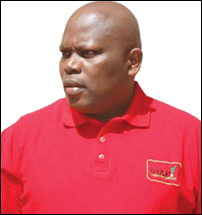STAK Congress 2016 to Discuss Impact of Global Warming on Kenyan Farmers
 A local seed industry players association has warned that climate change is a reality and not a myth anymore, and has called on farmers to prepare to respond to the phenomenon by putting in place mitigating measures.
A local seed industry players association has warned that climate change is a reality and not a myth anymore, and has called on farmers to prepare to respond to the phenomenon by putting in place mitigating measures.
“Global warming is here with us. The phenomenon of climate change in Kenya is now more apparent than has been before in recent history,” says Mr. Duncan Ochieng Onduu, the Chief Executive Officer, of STAK. The Seed Trader Association of Kenya (STAK) is one body that is not taking this for granted. To keep farmers and other stakeholders abreast of developments in this area, STAK will host an Annual Congress and Expo, from November 8-9, 2016, at Safari Park Hotel, Nairobi, Kenya. This year’s theme is “Utilizing Agricultural Technology to Mitigate against Climate Change and Improve Agricultural Productivity”.
“While Kenyan farmers may for example not be able to agree on the scientific explanation of global warming, one thing that is clear is that they have experienced it first-hand, with the inability to predict the onset of rains unlike the case before. The sun is scorching and the environment unforgiving,” he said while announcing the details for the upcoming Congress.
The trade expo is expected to attract over 300 delegates involved in the seed industry, including government officials, development partners, research institutions, universities, agrochemical industry players, processors, machinery suppliers, farmers and the media. The Congress sessions will focus on the seed industry, policy environment for seed trade, climate change and agricultural productivity, seed production, marketing and technological issues.
The congress comes in the backdrop of the recently concluded African Green Revolution Forum that was held at the United Nations Complex in Gigiri, Nairobi, which underscored the critical role that agriculture plays in ensuring food security and livelihoods for the continent’s population.
The Congress is also happening at a time when the UN is urging world nations to ratify the Paris pact on climate change, which was adopted by 195 parties to the UN Framework Convention on Climate Change last December in Paris. The agreement calls on countries to combat climate change and to accelerate and intensify the actions and investments needed for a sustainable low carbon future.
To date, STAK has organized four very successful congresses and expos. The STAK annual congress is an ideal platform not only to showcase available products, but also to sensitize the seed industry on pertinent issues affecting it. These forums provide a platform for experience sharing, and are a way of spurring growth and development, as well as addressing any pertinent issues affecting the seed value chain in any particular year.
Background
STAK is an association of Kenyan seed companies and organizations, registered to produce process and distribute seeds, as well as play other supportive roles to agriculture. STAK aims to promote the interests of seed enterprises through championing the use of quality seed. It is a member of both the African Seed Trade Association (AFSTA) and the International Seed Federation (ISF). STAK is a significant contributor in ensuring food security, in line with Government of Kenya Vision 2030’s aim of transforming every aspect of Kenyan lives through agriculture, and in line with the UN’s Sustainable Development Goals (SDGs).
STAK diligently represents its members and creates an enabling environment for the seed sector in Kenya, promotes the competitiveness, growth, and professionalism of the sector, and avails high quality seeds of the best varieties to all Kenyan farmers. It has represented its members’ interests since 1982.
STAK also provides members with expert seed sector advocacy, timely and comprehensive information sharing, capacity building to improve competitiveness, networking opportunities, and promotion of the development of a formal seed trade.
Against this background, STAK has become the focal point for industry representation, promotion, and compliance to pertinent local and international standards, deemed necessary to secure, expand and sustain markets.